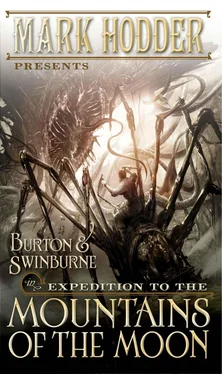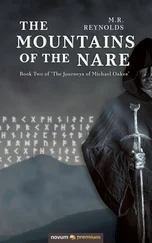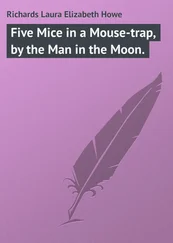Mark Hodder - Expedition to the Mountains of the Moon
Здесь есть возможность читать онлайн «Mark Hodder - Expedition to the Mountains of the Moon» весь текст электронной книги совершенно бесплатно (целиком полную версию без сокращений). В некоторых случаях можно слушать аудио, скачать через торрент в формате fb2 и присутствует краткое содержание. Жанр: sf_stimpank, на английском языке. Описание произведения, (предисловие) а так же отзывы посетителей доступны на портале библиотеки ЛибКат.
- Название:Expedition to the Mountains of the Moon
- Автор:
- Жанр:
- Год:неизвестен
- ISBN:нет данных
- Рейтинг книги:5 / 5. Голосов: 1
-
Избранное:Добавить в избранное
- Отзывы:
-
Ваша оценка:
- 100
- 1
- 2
- 3
- 4
- 5
Expedition to the Mountains of the Moon: краткое содержание, описание и аннотация
Предлагаем к чтению аннотацию, описание, краткое содержание или предисловие (зависит от того, что написал сам автор книги «Expedition to the Mountains of the Moon»). Если вы не нашли необходимую информацию о книге — напишите в комментариях, мы постараемся отыскать её.
Expedition to the Mountains of the Moon — читать онлайн бесплатно полную книгу (весь текст) целиком
Ниже представлен текст книги, разбитый по страницам. Система сохранения места последней прочитанной страницы, позволяет с удобством читать онлайн бесплатно книгу «Expedition to the Mountains of the Moon», без необходимости каждый раз заново искать на чём Вы остановились. Поставьте закладку, и сможете в любой момент перейти на страницу, на которой закончили чтение.
Интервал:
Закладка:
Burton's jaw worked. For a moment, he found it impossible to speak. His legs felt as if they couldn't hold him, and he collapsed down onto a roll of cloth, sitting with one arm outstretched, still clutching Trounce.
“Bismillah! The bloody fool!” he whispered and looked up at his friend.
Trounce was shocked to see that the explorer's normally sullen eyes were filled with pain.
“What's happened?” he asked.
“Tom was next to me when the Prussians and Arabs started to powwow,” Burton explained huskily. “We were near Herbert, just a little way past him. The parley threatened to ruin our entire plan. The Arab who lost patience with the conflab and ran out shooting saved the day for us. Except-”
“Oh no!” Trounce gasped as the truth dawned.
“I think Tom may have crawled back to Herbert, taken his robes, put them on, and-”
“No!” Trounce repeated.
They gazed at each other, frozen in a moment of anguish, then Burton stood and said, “I'm going to check the bodies.”
“I'm coming with you.”
They borrowed a couple of horses from Isabel and, by the light of brands, guided their mounts along the path to the fields then galloped across the cultivated ground to where the dead had been laid out. Dismounting, they walked up and down the rows, examining the corpses. The Prussians were ignored, but each time either man came to a slaver, he bent and pulled back the cloth that covered the corpse's face.
“William,” Burton said quietly.
Trounce looked up from the man he'd just inspected and saw the explorer standing over a body. Burton's shoulders were hunched and his arms hung loosely.
Something like a sob escaped from the Scotland Yard man, and the world seemed to whirl dizzyingly around him as he staggered over to his friend's side and looked down at Thomas Manfred Honesty.
His fellow detective was wrapped in the robes-ragged and blood-stained-that he'd borrowed from Spencer. He'd been riddled with bullets and must have died instantly, but it was no consolation to Trounce, for the little man, who'd mocked him for nearly two decades over his belief in Spring Heeled Jack, had, in the past couple of years, become one of his best friends.
“He sacrificed himself to save us,” Burton whispered.
Trounce couldn't reply.
They buried Thomas Honesty the next morning, in the little glade to the north of the village.
Burton spoke of his friend's bravery, determination, and heroism.
Trounce talked hoarsely of Honesty's many years of police service, his exemplary record, his wife, and his fondness for gardening.
Krishnamurthy told of the respect the detective inspector had earned from the lower ranks in the force.
Swinburne stepped forward, placed a wreath of jungle flowers on the grave, and said:
“For thee, O now a silent soul, my brother,
Take at my hands this garland, and farewell.”
Sister Raghavendra softly sang “Abide with Me,” then they filed back along the trail to the village, a subdued and saddened group.
For most of the rest of the day, Burton and his fellows caught up with lost sleep. Not so William Trounce. He'd found a large flat stone on the slope beneath the village, and, borrowing a chisel-like tool from one of the locals, he set about carving an inscription into it, sitting alone, far enough away from the huts that his chipping and scraping wouldn't disturb his slumbering companions. It took him the better part of the day to complete it, and when it was done, he took it to the glade, placed it on the grave, and sat on the grass.
“I'm not sure I really understand it, old chap,” he murmured, “but apparently the whole Spring Heeled Jack business sent us all off in a different direction. None of us is doing what we were supposed to be doing, although I rather think I would have carried on as policemen no matter what.”
He rested a hand on the stone.
“Captain Burton says this history we're in isn't the only one, and, in any of the others, meddlers like Edward Oxford might be at work, and whenever they tamper with events, they cause new histories. Can you imagine that? All those different variations of you and me? The thing of it is, my friend, I hope-I really hope-that, somewhere, a Tom Honesty will be tending his garden well into old age.”
He sat for a few minutes more, then bent over and kissed the stone, stood, sighed, and walked away.
The tear he left behind trickled into the inscription, ran down the tail of the letter “y,” and settled around a seed in Swinburne's wreath.
CHAPTER 8
Omne solum forti patria.
(Every region is a strong man's home.)
— Sir Richard Francis Burton's mottoThe clangour of the parade bell sounded and voices hollered: “Aufwachen! Aufwachen! ”
In Barrack 5, Compound B, of Stalag IV at Ugogi, Sir Richard Francis Burton and his fellow prisoners of war dragged themselves wearily from their bunks, quickly put on their grey uniforms, and tumbled out onto the dusty parade ground, which was baking in the afternoon heat.
Obeying shouted orders, they arranged themselves into three rows, facing forward, blinking and screwing up their faces as the glare of the white sky burned the sleep out of their eyes.
“What now?” the man to Burton's right grumbled. “Surely they can't be sending us back to the pass already?”
“They'll work us to death as long as they get the blasted road built,” another man growled.
They were referring to the passage the prisoners had been carving through the Usagara Mountains. Burton and his fellows had originally been incarcerated at Stalag III, near Zungomero, on the other side of the range. From there, they'd been escorted out daily, in a chain gang, to work on the road. When the halfway point had been reached, three months ago, they'd been marched to this new POW camp at Ugogi to commence the second half of the route.
From his place midway along the second row, Burton looked up at the guard towers. The man-things in them, standing with their mounted seedpods trained on the prisoners, appeared rather more alert than usual.
Over to the left, the gates in the high barbed-wire fence surrounding the compound were swinging shut, and inside, a large plant had just drawn to a halt, squatting down on its roots. A group of German officers stepped out of the vehicle.
“Bloody hell!” a man gasped. “That's Lettow-Vorbeck!”
“Which one?” Burton asked.
“The small bloke with the wide-brimmed hat. What the hell is he doing here?”
Burton watched as the officer, with a swagger stick under his right arm and a leather briefcase in his left hand, met with Oberstleutnant Maximilian Metzger, the camp commandant. They conversed for a few minutes then marched over to the lined-up prisoners and started walking from one end of the first row to the other. They gave each man a cursory glance, reached the end of the line, then proceeded down the second row.
When they reached Burton, they stopped and Metzger said: “Hier, Generalmajor! Hier ist der gesuchte Mann!”
Lettow-Vorbeck examined Burton's face. He pulled a photograph from his pocket, looked at it, and nodded.
“Sehr Gut gemacht! Bringen Sie ihn her!”
Metzger signalled to two rhino guards. They stamped over, took Burton by the elbows, and dragged him out of the line. He was taken across the parade ground, into the commandant's office, and pushed into a chair opposite a heavy desk. The guards stood to attention to either side of him.
Lettow-Vorbeck entered and barked: “Lassen Sie uns allein!”
The guards clicked their heels and thudded out.
There was a clockwork fan revolving on the ceiling. Burton leaned his head back, closed his eyes, and allowed the air to wash over his face. He was weary to the bone.
Читать дальшеИнтервал:
Закладка:
Похожие книги на «Expedition to the Mountains of the Moon»
Представляем Вашему вниманию похожие книги на «Expedition to the Mountains of the Moon» списком для выбора. Мы отобрали схожую по названию и смыслу литературу в надежде предоставить читателям больше вариантов отыскать новые, интересные, ещё непрочитанные произведения.
Обсуждение, отзывы о книге «Expedition to the Mountains of the Moon» и просто собственные мнения читателей. Оставьте ваши комментарии, напишите, что Вы думаете о произведении, его смысле или главных героях. Укажите что конкретно понравилось, а что нет, и почему Вы так считаете.












